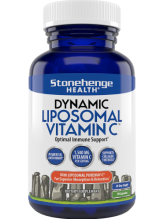Table of Contents
Vitamin C is a powerful micronutrient that is essential to our health and is considered by many as the go-to supplement to boost the immune system during the cold, flu, and virus season. However, many of us have begun supplementing with vitamin C all year round for the benefits it offers to brain, heart, and skin health.
While the human body requires vitamin C to perform many essential functions, it can’t produce it on its own. Thankfully, vitamin C, also known as ascorbic acid, can be found naturally in abundance in a variety of citrus fruits and even vegetables like broccoli. So, with all of these natural sources and even food being fortified with vitamin C, you may be surprised to know that a study of 16,000 Americans found that 33% are deficient in vitamin C.1 That is one out of every three people.
Even just moderate vitamin C deficiency can lead to a weakened immune system, fatigue, chronic pain, dry and rough skin, impaired wound healing, weight gain, and heart disease.2-5
How To Pick A Good Vitamin C Supplement & Avoid The Junk
There is little doubt that with the current flu and virus season upon us, the popularity has led to hundreds of vitamin C supplements flooding the marketplace. While these supplements all promise to deliver benefits, the reality is that many fall short. Some of the most popular brands use ineffective or insufficient doses of vitamin C, and many contain potentially harmful fillers and additives.
With so many options, it seems many of us might still be unclear about what to look for in a quality vitamin C supplement. To help cut through the clutter, we have compiled months of research into this short guide to help you know what to look for and what to avoid. We will also list out the top 5 vitamin C supplements sold today.
4 Things To AVOID
When Buying A Vitamin C Supplement
1. Soy Lecithin
Avoid vitamin C formulas that contain soy lecithin as it is sourced from genetically modified soybeans, which go through a harsh extraction method that uses hexane. This harmful chemical solvent is also used in glue and varnishes.14 Soy lecithin is also a cause of food allergies.15
2. Bioflavonoids
Many manufacturers claim that they can increase the absorption of vitamin C by formulating their products with bioflavonoids, which are nutrients found in the rinds of citrus fruits. While flavonoids are well known for their antioxidant benefits, there is a lack of scientific evidence backing the marketing hype that, when combined with vitamin C, it can increase the absorption rate.16,17
3. Relying on Amazon Reviews
Research showed that in March 2019, there were 1.8 million new unverified reviews, with an average of 99.6% of them being 5-star reviews.18 Most of these reviews are from people paid to write them. These fake reviews inflate the number and overall star rating of a product. When deciding on a product that can impact your health, don’t rely on Amazon reviews as they can be extremely misleading.
4. Insufficient Return Policy
A reputable vitamin C supplement brand will demonstrate they have faith in their product by offering a 100% money-back guarantee policy. Some try to complicate their refund policies by placing limitations on what kind of returns they will take. Avoid any brand that does not have at minimum a no questions asked 90-day money-back guarantee.

2024’s Top Five Vitamin C Supplements
Our review encompassed 84 different vitamin C supplements, putting each through our rigorous Review Scout assessment process. To determine 2024’s Top 5 Vitamin C Supplements, we look for predicted effectiveness, supporting studies, safety, pricing, return policy, and overall customer satisfaction.
PROS
- Liposomal Technology
- Phosphatidylcholine from Sunflower
- Potent 1,500 mg daily dose
- Endorsed by a Doctor
- Vegetarian Capsules, Non-GMO, Gluten-Free
- Verified 90-day 100% money-back return policy
CONS
- Often out of stock due to high demand
Why We Chose It
Stonehenge Health's Dynamic Liposomal Vitamin C is Review Scout's top choice. This formula contains a potent 1,500 mg dose of Vitamin C encased in a high-quality liposomal delivery system.
In reviewing dozens of vitamin C brands, we found that most use the basic water-soluble form of vitamin C, which tends to have absorption challenges. Stonehenge Health also uses phosphatidylcholine sourced from non-GMO sunflower, instead of soy like many other liposomal formulas. We are confident your body will get the maximum benefits from this vitamin C supplement.
Dynamic Liposomal Vitamin C also uses phosphatidylcholine and not bioflavonoids to maximize absorption. We verified that Stonehenge Health’s formula does not contain synthetic fillers or artificial ingredients and does not use the dangerous chemical Hexane.
Stonehenge Health backs its products with a no-questions-asked, 90-day money-back guarantee and is one of the few brands to be endorsed by a board-certified doctor. We also like that they offer customers discounts on bundles. Click on the link below to see their current specials.
*Results are based on user-generated experiences with these products, and individual results may vary. Please refer to the manufacturer’s product website for detailed information.
#2 LivOn Laboratories Lypo–Spheric Vitamin C
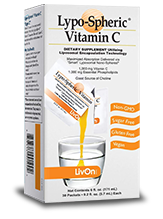
A-
Overall Grade
#2 LivOn Laboratories Lypo–Spheric Vitamin C
-
OVERALL RATING
8.7/10
-
Predicted Effectiveness
9.4/10
-
Ingredient Quality
9.3/10
-
Value
7/10
-
Return Policy
9.8/10
-
User Rating
8.2/10
PROS
- Liposomal Technology
- Contains Phosphatidylcholine
- Potent 2,000 mg daily dose
- Non-GMO, no Gluten, dairy, sugar, artificial ingredients, or fillers
- Lifetime return policy
CONS
- Very expensive
- Made from Soy Lecithin
- Not appropriate for those limiting their salt intake
- Requires to be mixed with water
- User complaints related to product taste, headaches & digestive discomfort
Why We Chose It
LivOn Laboratories Lypo–Spheric® Vitamin C is a quality liposomal product that uses a patented delivery system. The product contains a daily dose of 1,000 mg of vitamin C and 1,000 mg of phosphatidylcholine. While we were happy to see that LivOn Laboratories uses phosphatidylcholine as its phospholipid source, we were disappointed to see that it is sourced from soy lecithin. The company states that the soy is non-GMO, but it still may not be suitable for those who have soy allergies or trying to eliminate soy from their diets.
The product comes in individual serving packets containing a gel that needs to be squeezed into cold water. The gel does not dissolve, and users have complained it tastes like salty Vaseline. The salt taste likely comes from LivOn’s uses of sodium ascorbate, a form of ascorbic acid. Some feel that sodium ascorbate can reduce the acidity of vitamin C. However, it may not be appropriate for users who are needing to reduce or eliminate salt from their diet. LivOn Laboratories ingredients come in at a close second to the top-ranked brand on our list.
*Results are based on user-generated experiences with these products, and individual results may vary. Please refer to the manufacturer’s product website for detailed information.
#3 American Health Ester-C ®
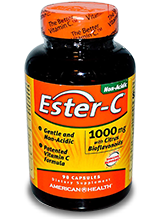
B
Overall Grade
#3 American Health Ester-C ®
-
OVERALL RATING
8.2/10
-
Predicted Effectiveness
8.5/10
-
Ingredient Quality
8.8/10
-
Value
8.7/10
-
Return Policy
7.5/10
-
User Rating
7.6/10
PROS
- 1,000 mg daily dose
- Vitamin C as Ester-C®
- Contains Bioflavonoids
- Veggie capsules, Non-GMO, and gluten-free
CONS
- Lower than an optimal amount of vitamin C
- Contains Gelatin
- Large capsules are difficult to swallow
- Quality concerns regarding empty capsules
- Return policy limited to point of purchase
Why We Chose It
American Health’s vitamin C uses Ester-C® with added citrus bioflavonoids. The daily dose is 1,000 mg, which is a bit lower than our recommended 1,500 mg dose. This formula uses Ester-C® , which is calcium added to ascorbic acid to help to reduce the acidic feeling some users experience when taking basic ascorbic acid. Various manufacturers claim that Ester-C® offers better absorption, but to date, there is no reliable evidence to support this claim. American Health also uses bioflavonoids to claim better absorption. However, as we previously noted, there is a lack of scientific evidence backing marketing claims regarding bioflavonoids and absorption.
Consumers have voiced concerns about receiving bottles with some capsules either unfilled or only partially filled. Additionally, some users have found that the large 1,000 mg capsule is too difficult to swallow. Lastly, American Health does not offer any product guarantee or return policy on their website.
*Results are based on user-generated experiences with these products, and individual results may vary. Please refer to the manufacturer’s product website for detailed information.
#4 Emergen-C
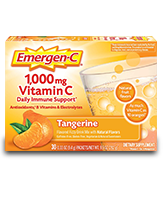
C+
Overall Grade
#4 Emergen-C
-
OVERALL RATING
7.7/10
-
Predicted Effectiveness
7.7/10
-
Ingredient Quality
7.4/10
-
Value
7.8/10
-
Return Policy
7.5/10
-
User Rating
8.3/10
PROS
- 1,000 mg dose of Vitamin C
- Contains Zinc, Vitamin E, and Manganese
- Non-GMO and Gluten-Free
CONS
- Lower than an optimal dose of vitamin C
- Uses standard ascorbic acid
- Contains maltodextrin and silicon dioxide
- Contains Sugar
- Return policy limited to point of purchase
Why We Chose It
Emergen-C is a popular product that combines vitamin C and B with other vitamins and nutrients. Each dose comes in an individual packet of powder that needs to be mixed with water. The vitamin C used in this formula is standard ascorbic acid with a daily dose of 1,000 mg. The dosage is lower than other brands we evaluated, and there is little in this formula to help with absorption. However, Emergen-C does include zinc ascorbate, which some studies have shown can be beneficial for the immune system.30 Unfortunately, those studies used a minimum of 75 mg of zinc, and Emergen-C only has 2 mg. So, you may not want to rely too heavily on the zinc in this formula to offer much immune support. This brand has done a good job marketing its product over the years but found itself having to settle a class-action lawsuit in 2014 because they could not substantiate the claims they made. We found Emergen-C to be similar to Airborne in the fact that they don’t pack a potent and highly bioavailable dose of vitamin C but have elements that are like a low-dose multi-vitamin.
*Results are based on user-generated experiences with these products, and individual results may vary. Please refer to the manufacturer’s product website for detailed information.
#5 Vimergy Micro-C® Capsules
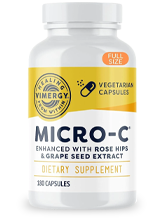
C-
Overall Grade
#5 Vimergy Micro-C® Capsules
-
OVERALL RATING
7.0/10
-
Predicted Effectiveness
6.6/10
-
Ingredient Quality
7.1/10
-
Value
6.9/10
-
Return Policy
7.2/10
-
User Rating
7.2/10
PROS
- 500 mg of Vitamin C
- Paleo, Vegan, Gluten-Free, Non-GMO
CONS
- Uses all calcium and magnesium ascorbate
- No Liposome technology
- Only 30-day return policy
- Only gives returns for unopened bottles
Why We Chose It
Vimergy Micro-C® Capsules are unique in that they combine Vitamin C with Rutin, Grapeseed Extract, Rose Hips Fruit Powder, and Acerola Fruit Extract.
However, this formula offers the lowest dose of Standard vitamin C of all our picks, 500 mg, and uses the most basic delivery system. We would have preferred to see Liposome technology to increase vitamin C absorption.
The vitamin C in this formula is also from calcium ascorbate and magnesium ascorbate, which the brand touts as low-acidity vitamin C, to create an effective, buffered formula that’s easy on the stomach and digestive tract, but we know from research there is little to support this hypothesis.
Additionally, we found their return policy to be disappointing. Vimergy only offers returns after 30 days for unopened bottles, which doesn’t give the consumer any freedom to try a new product risk-free. We prefer to see a 90-day no-questions-asked return policy, like our top-rated brand offers.
*Results are based on user-generated experiences with these products, and individual results may vary. Please refer to the manufacturer’s product website for detailed information.
Citations
- Wallace TC, et al. 2020. “Multivitamin/Mineral Supplement Contribution To Micronutrient Intakes In The United States, 2007-2010. – Pubmed – NCBI “. Ncbi.Nlm.Nih.Gov. https://www.ncbi.nlm.nih.gov/pubmed/24724766.
- Helmersson J, et al. 2020. “Low Dietary Intake Of Beta-Carotene, Alpha-Tocopherol And Ascorbic Acid Is Associated With Increased Inflammatory And Oxidative Stress Status In A … – Pubmed – NCBI “. Ncbi.Nlm.Nih.Gov. https://www.ncbi.nlm.nih.gov/pubmed/19079838.
- Carr, Anitra, and Silvia Maggini. 2017. “Vitamin C And Immune Function”. Nutrients 9 (11): 1211. doi:10.3390/nu9111211.
- Canoy D, et al. 2020. “Plasma Ascorbic Acid Concentrations And Fat Distribution In 19,068 British Men And Women In The European Prospective Investigation Into Cancer And … – Pubmed – NCBI “. Ncbi.Nlm.Nih.Gov. https://www.ncbi.nlm.nih.gov/pubmed/16332652.
- Moser, Melissa, and Ock Chun. 2016. “Vitamin C And Heart Health: A Review Based On Findings From Epidemiologic Studies”. International Journal Of Molecular Sciences 17 (8): 1328. doi:10.3390/ijms17081328.
- Wintergerst ES, et al. 2020. “Immune-Enhancing Role Of Vitamin C And Zinc And Effect On Clinical Conditions. – Pubmed – NCBI “. Ncbi.Nlm.Nih.Gov. https://www.ncbi.nlm.nih.gov/pubmed/16373990.
- Lobo, V, A Patil, A Phatak, and N Chandra. 2010. “Free Radicals, Antioxidants And Functional Foods: Impact On Human Health”. Pharmacognosy Reviews 4 (8): 118. doi:10.4103/0973-7847.70902.
- Lien Ai Pham-Huy, Chuong Pham-Huy. 2008. “Free Radicals, Antioxidants In Disease And Health”. International Journal Of Biomedical Science : IJBS 4 (2): 89. https://www.ncbi.nlm.nih.gov/pmc/articles/PMC3614697/.
- “Study With Smokers Shows Vitamins Combine For Benefits”. 2020. Sciencedaily. https://www.sciencedaily.com/releases/2006/02/060224104219.htm.
- Travica, Nikolaj, Karin Ried, Avni Sali, Andrew Scholey, Irene Hudson, and Andrew Pipingas. 2017. “Vitamin C Status And Cognitive Function: A Systematic Review”. Nutrients 9 (9): 960. doi:10.3390/nu9090960.
- Harrison, Fiona E. 2012. “A Critical Review Of Vitamin C For The Prevention Of Age-Related Cognitive Decline And Alzheimer’s Disease”. Journal Of Alzheimer’s Disease 29 (4): 711-726. doi:10.3233/jad-2012-111853.
- McRae, Marc P. 2008. “Vitamin C Supplementation Lowers Serum Low-Density Lipoprotein Cholesterol And Triglycerides: A Meta-Analysis Of 13 Randomized Controlled Trials”. Journal Of Chiropractic Medicine 7 (2): 48-58. doi:10.1016/j.jcme.2008.01.002.
- “The Roles Of Vitamin C In Skin Health”. 2017. Nutrients 9 (8): 866. doi:10.3390/nu9080866.
- Scholfield, C. R. 1981. “Composition Of Soybean Lecithin”. Journal Of The American Oil Chemists’ Society 58 (10): 889-892. doi:10.1007/bf02659652.
- 2020. Karger.Com. https://www.karger.com/Article/Abstract/49517.
- Russo, A., R. Acquaviva, A. Campisi, V. Sorrenti, C. Di Giacomo, G. Virgata, M.L. Barcellona, and A. Vanella. 2000. Cell Biology And Toxicology 16 (2): 91-98. doi:10.1023/a:1007685909018.
- Johnston, Carol S, and Bing Luo. 1994. “Comparison Of The Absorption And Excretion Of Three Commercially Available Sources Of Vitamin C”. Journal Of The American Dietetic Association 94 (7): 779-781. doi:10.1016/0002-8223(94)91950-x.
- Amazon Flooded With Millions Of Fake Reviews In 2019 – Reviewmeta Blog “. 2019. Reviewmeta.Com. https://reviewmeta.com/blog/amazon-flooded-with-millions-of-fake-reviews-in-2019/.
- Li, Yi, and Herb E. Schellhorn. 2007. “New Developments And Novel Therapeutic Perspectives For Vitamin C”. The Journal Of Nutrition 137 (10): 2171-2184. doi:10.1093/jn/137.10.2171.
- “Office Of Dietary Supplements – Vitamin C”. 2020. Ods.Od.Nih.Gov. https://ods.od.nih.gov/factsheets/VitaminC-HealthProfessional/.
- “Vitamin C”. 2012. The Nutrition Source. https://www.hsph.harvard.edu/nutritionsource/vitamin-c/.
- “Liposomal-Encapsulated Ascorbic Acid: Influence On Vitamin C Bioavailability And Capacity To Protect Against Ischemia–Reperfusion Injury – Janelle L. Davis, Hunter L. Paris, Joseph W. Beals, Scott E. Binns, Gregory R. Giordano, Rebecca L. Scalzo, Melani M. Schweder, Emek Blair, Christopher Bell, 2016”. 2020. Nutrition And Metabolic Insights. https://journals.sagepub.com/doi/full/10.4137/NMI.S39764.
- Hon-Wing, Leung, Michael J. Vang, and Richard D. Mavis. 1981. “The Cooperative Interaction Between Vitamin E And Vitamin C In Suppression Of Peroxidation Of Membrane Phospholipids”. Biochimica Et Biophysica Acta (BBA) – Lipids And Lipid Metabolism 664 (2): 266-272. doi:10.1016/0005-2760(81)90049-7.
- Cohn, Jeffrey, Alvin Kamili, Elaine Wat, Rosanna W. Chung, and Sally Tandy. 2010. “Dietary Phospholipids And Intestinal Cholesterol Absorption”. Nutrients 2 (2): 116-127. doi:10.3390/nu2020116.
- Chung SY, et al. 2020. “Administration Of Phosphatidylcholine Increases Brain Acetylcholine Concentration And Improves Memory In Mice With Dementia. – Pubmed – NCBI “. Ncbi.Nlm.Nih.Gov. https://www.ncbi.nlm.nih.gov/pubmed/7782901.
- Tandy, Sally, Rosanna W.S. Chung, Alvin Kamili, Elaine Wat, Jacquelyn M. Weir, Peter J. Meikle, and Jeffrey S. Cohn. 2010. “Hydrogenated Phosphatidylcholine Supplementation Reduces Hepatic Lipid Levels In Mice Fed A High-Fat Diet”. Atherosclerosis 213 (1): 142-147. doi:10.1016/j.atherosclerosis.2010.07.050.
- Schneider, Hannah, Annika Braun, Joachim Füllekrug, Wolfgang Stremmel, and Robert Ehehalt. 2010. “Lipid Based Therapy For Ulcerative Colitis—Modulation Of Intestinal Mucus Membrane Phospholipids As A Tool To Influence Inflammation”. International Journal Of Molecular Sciences 11 (10): 4149-4164. doi:10.3390/ijms11104149.
- Holló, J., J. Perédi, A. Ruzics, M. Jeránek, and A. Erdélyi. 1993. “Sunflower Lecithin And Possibilities For Utilization”. Journal Of The American Oil Chemists’ Society 70 (10): 997-1001. doi:10.1007/bf02543026.
- “Office Of Dietary Supplements – Vitamin C”. 2020. Ods.Od.Nih.Gov. https://ods.od.nih.gov/factsheets/VitaminC-HealthProfessional/.
- H, Maares. 2020. “Zinc And Immunity: An Essential Interrelation. – Pubmed – NCBI “. Ncbi.Nlm.Nih.Gov. https://www.ncbi.nlm.nih.gov/pubmed/27021581.





 Boosts Immunity
Boosts Immunity Powerful Antioxidant
Powerful Antioxidant Enhances Brain Function
Enhances Brain Function Improves Heart Health
Improves Heart Health Improves Collagen Production
Improves Collagen Production